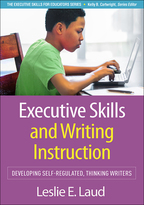Executive Skills and Writing Instruction
Developing Self-Regulated, Thinking Writers
Leslie E. Laud
HardcoverPaperbacke-bookprint + e-book
Hardcover
orderNovember 27, 2025
ISBN 9781462558957
Price: $60.00 228 Pages
Size: 7" x 10"
Paperback
orderNovember 20, 2025
ISBN 9781462558940
Price: $40.00228 Pages
Size: 7" x 10"
e-book
orderNovember 12, 2025
PDF and Accessible ePub ?
Price: $40.00 228 Pages
ePub is Global Certified Accessible
print + e-book $80.00 $48.00
orderPaperback + e-Book (PDF and Accessible ePub) ?
Price: 228 Pages
ePub is Global Certified Accessible
Students learn to write well by developing fundamental literacy skills—and also by knowing how to get started, stay on track, and persist toward meaningful goals. From leading science-of-writing expert Leslie E. Laud, this is the first book that helps K–12 educators harness the power of executive skills in evidence-based writing instruction. Laud shows how self-regulation supports learning and growth in every step of the writing process, from planning to drafting, editing, and revising. The book provides a clear roadmap and practical strategies for teaching and scaffolding both writing skills and executive skills. It is packed with sample lessons, writing prompts, extended examples, “Take It to the Classroom” tips, and reproducible/downloadable tools.
This title is part of the Executive Skills for Educators Series, edited by Kelly B. Cartwright.
“Laud provided professional development in our district for several years. Student writing performance improved because our educators improved their practice by learning and applying the strategies now detailed in this book. We moved from the middle of the pack on the state assessment to a top-five performing district. Most important, our students learned skills that will last a lifetime. I could not recommend a book more highly!”
—Robert Mitchell, MEd, Retired Superintendent, Cumberland School Department, Cumberland, Rhode Island
“What an excellent book! The format is highly accessible, offering strategies that strengthen executive functions like working memory, planning, organization, and self-monitoring. Teachers learn to co-construct writing goals with students, implement think-alouds to model planning and revision, and teach students how to manage their emotions and reflect on their learning process. The ripple effect will extend beyond writing, supporting skills that help across the academic day and beyond. This book equips educators to unlock the full potential of their learners, making it a ‘must-have’ for any teacher, interventionist, or teacher educator. I can’t wait to use it for professional development!”
—Faith Borkowsky, MSEd, literacy consultant, New York; co-host, “The Literacy View” podcast
“This book is set to change how teachers approach writing instruction in real classrooms. Laud brings research to life through clear, powerful strategies that teachers can use right away. Yet the true strength of Laud’s approach lies in how it helps students believe in themselves. By explicitly teaching executive skills, teachers can foster not only better writing but also greater self-regulation, resilience, and joy in learning. The book offers a roadmap for empowering all learners, especially those who have struggled or felt left behind. A highly valuable resource for educators who seek practical tools rooted in science—and in empathy.”
—Teresa Limpo, PhD, private practice; formerly Faculty of Psychology and Education Sciences, University of Porto, Portugal
“More than a collection of evidence-based strategies, this book shows how to move the needle for student literacy skills and self-confidence, regardless of content or grade level. Laud ‘pulls back the curtain’ for educators by showing why executive skills are so important to writing and learning and how to seamlessly support them within any curriculum. The book provides example lessons, modeled teacher self-talk, and ‘deep-dive’ explanations. After a year of using this framework, I have been blown away by the positive changes in my students’ writing skills, comprehension, text analysis, classroom behavior, and growth mindsets.”
—Kathleen M. Thiel, MEd, high school English teacher, Downingtown Area School District, Exton, Pennsylvania
“Laud didn’t just read every study she cites in this book; she analyzed them deeply, discussed them with colleagues, and even reached out to the original authors to ensure her interpretations were sound. Her commitment to getting it right is unmatched. In a field crowded with self-proclaimed experts and distant academic voices, Laud is a rare gem. She writes from the perspective of a teacher, for teachers—grounded, humble, and relentlessly honest. I wholeheartedly recommend this book to anyone serious about improving their writing instruction.”
—Nathaniel Hansford, author of The Scientific Principles of Teaching
Table of Contents
1. Executive Skills: What They Are, and Why They Matter in Learning to Write
2. The End Game: A Framework for Developing Self-Regulating Writers
3. Planning: Teach and Model the Writing Process
4. Organization: Text Structure
5. Cognitive Flexibility: The Key to Varied Vocabulary and Strong Sentences
6. Working Memory: Transcribing Ideas While Holding Them in Mind
7. Inhibition and Self-Monitoring: Goal-Driven Revision
8. Social Understanding: Audience Awareness and Peer Connections
Epilogue
Appendix of Resources and Reproducibles
References
Index
